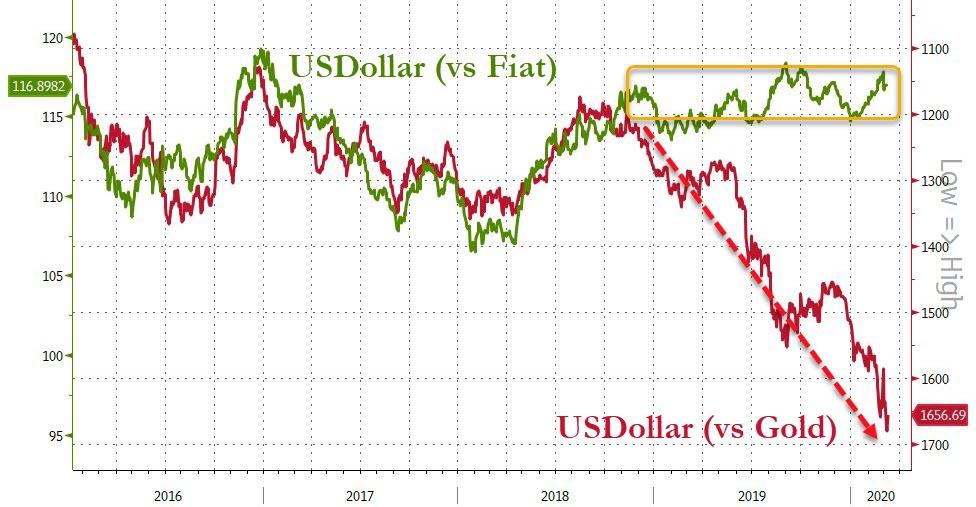- Italy was judged to have the second best healthcare system worldwide. Things out of control.
- US prepares for 96 million cases and 480,000 deathsUS CDC Chief: "the US is beyond virus containment in some areas"
-
Washington State considering "Rapid Lockdown", new benefits announced for workers
-
Lagarde calls on European governments to embrace "rapid fiscal action."
-
Austria, Switzerland close borders with Italy
-
NJ Governor declares state of emergency
-
North Carolina declares state of emergency
As CNBC just reported, the novel coronavirus has finally hit Wall Street. Barclays on Tuesday confirmed that an employee in its New York City midtown office has tested positive for Covid-19. The employee worked on the second floor. Morgan Stanley said an employee at its Purchase office has contracted the virus, but they started self-quarantining early enough to likely avoid exposing coworkers.
An employee at BlackRock in New York has also tested positive. And let's not forget Steve Cohen's Point72, where a back-office employee who worked on the 14th floor of the firm's NYC office reportedly tested positive.
- New York declares state of emergency
-
Harvard moves classes online
-
EU suspends parliament indefinitely
- Italian government suspends mortgage payments across country
- National Guard is deploying to New Rochelle, area businesses, schools will close, Cuomo says
http://archive.is/yu5OZ
Spanish Civil Guard keeping people quarantined
http://archive.is/qgPR0
Trapped with dead sister, infected, health system collapsed
http://archive.is/uIONI
All of Italy under lockdown, "red zone"
http://archive.is/1dWHC
Virus travels 4.5 meters, stays in air 30 minutes
http://archive.is/2YKrJ
Virus affects blood circulation
http://archive.is/evvHT
South Korea "recovered" case reinfected
http://archive.is/Gv1iu
HIV-like mutation made it 1000 times more infectious than SARS
http://archive.is/xwQVe
Recovered in Japan sick again: reinfected or dormant
http://archive.is/HjykE
nCoV manifests as lung abnormalities
http://doi.org/10.1016/S1473-3099(2
US prepares for 96 million cases and 480,000 deaths
http://archive.is/Hgdg5
China changes definitions 3 times in 8 days
http://archive.is/2xlZf
Over 90% of China under lock-down, 80% of GDP, 90% of exports
http://archive.is/HLAN0
210 dead in Iran, regime covers it up
http://archive.is/D7YcK
White House admits they lack tests
http://archive.is/mJkTy
Even The Best-Case Scenario Is Pretty Grim
Authored by John Rubino,Let’s say President Trump is right about the coronavirus “miraculously” fading away as temperatures rise in the Summer. Will things then go back to the old normal of globalization, free trade and finance-driven “growth”?

Almost certainly not, because the psychological damage has already been done. Over the past couple of weeks the modern globalized economy with its multi-nation supply chains and just-in-time inventory systems has been forced to recognize that such a system only works in a nearly-perfect environment.
Break any link in this chain and the whole thing grinds to a halt. One unavailable commodity or component, one out-of-service assembly plant, one country with closed borders or out-of-control civil unrest, and a multi-billion dollar revenue stream evaporates.
To varying degrees, the same threat hangs over pretty much every major product these days. Most of the world’s pharmaceutical building blocks come from China and India, for instance. Car parts are made in multiple countries before being shipped to assembly plants near consumers. Virtually all of this depends on an environment where trade flows are unhindered, capital is free to find its most efficient home, and shipping is frictionless. That’s the system the developed and developing worlds have collaborated to build in the past few decades. And now — in the blink of an eye — everyone recognizes it as ridiculously fragile and therefore way too risky to maintain.
Put yourself in the expensive shoes of a multinational company CEO. You’re staring into the abyss on this Monday morning, praying to your version of God and promising that if He lets you off the hook this time you’ll mend you ways. You’ll simplify those supply lines, bring as much action as possible back home, and end your reliance on debt-ridden “global manufacturing platforms” with unreliable public health systems. And you’ll start stockpiling inventory against what you now understand to be inevitable future disruptions.
These aren’t idle promises, to be forgotten the minute the crisis is past. Your board of directors and most of your shareholders now understand that globalization means “excessive risk” and while they may give you a pass on some bad earnings comparisons in 2020, they won’t accept a repeat performance in later years.
So…major companies in pretty much every sector of manufacturing will be forced to scale back their work in Asia and the rest of the developing world and bring much of it in-house or at least physically closer. This is at first glance a good thing for the US and maybe Europe, but it will be more than offset its devastating impact on China’s vast and massively over-indebted contract manufacturing sector and hyper-leveraged municipalities.
Which means the best case scenario is the long-awaited Chinese financial crisis. And with the rest of the world just as over-leveraged as China, the implications of the second biggest economy shifting into reverse and possibly descending into chaos are hard to predict in detail but easy to envision generally: turmoil in the currency, fixed income and stock markets which force the governments to push interest rates into negative territory and run deficits that dwarf those of the Great Recession.

If any major fiat currency is still functioning at the end of this process, that will be the real miracle.
